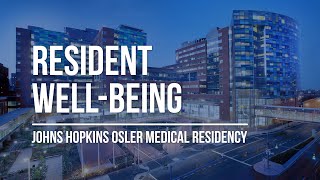Diversity, Equity, and Inclusion & Wellness
Diversity, Equity and Inclusion | Johns Hopkins Osler Medical Residency
We strive to provide an inclusion environment, community, and culture where residents of all backgrounds will thrive and feel empowered as they develop the foundation for their careers as leaders in medicine. Dr. Tinsay Woreta, associate program director for diversity, equity, and inclusion for the Osler Medical Residency, discusses our efforts to achieve this important goal.
We have worked to build a community for our underrepresented in medicine (UIM) trainees to provide mentorship, guidance, and social support for our trainees. Below is a list of our various initiatives:
- We created a regularly occurring series of open forum sessions for UIM residents to meet with program leadership to have an open space to confidentially discuss any issues on important topics such as building an inclusive and diverse community at Hopkins and finding mentorship.
- We have started having quarterly happy hours for UIM residents with program leadership to promote increased socialization and building community, including a welcome to our new interns in July.
- We attend with our residents regional and national meetings of organizations such as the Student National Medical Association and the Latino Medical Student Association to represent our program at these meetings.
- We work with the Department of Medicine Diversity Council on their important initiatives such as the Visiting 4th year medical student clerkship in Diversity and the Myron L. Weisfeldt Distinguished Visiting Professorship in Diversity, which our residents actively participate in.
- Our residents are also actively involved in the Housestaff Diversity Council at the institutional level and often take leadership roles in the council.
Wellness in the Osler Program
We are excited to have multiple wellness initiatives ongoing in the Osler Medical Residency, ranging from a resident Wellness Committee, scheduled intern reflection sessions, a narrative medicine writing program, and more.
Narrative Medicine Program
Narrative medicine is “medicine practiced with these skills of recognizing, absorbing, interpreting, and being moved by the stories of illness.” This definition by Dr. Rita Charon harkens back to William Osler himself, who once advised his acolytes that “nothing will sustain you more potently than the power to recognize in your humdrum routine, as perhaps it may be thought, the true poetry of life.”
Narrative medicine curricula have been shown to increase trainee identification with peers and the profession, improve work satisfaction and sense of wellness, and deepen empathy for and connection to patients. The narrative medicine group, which is led by faculty member (C. Nicholas Cuneo, M.D., M.P.H.), covers a variety of topics such as narrative advocacy; personal disclosure; close reading of text; imagination and fiction; the ethics of storytelling; writing about grief and suffering; empathy and burnout; developing a public platform; and the publishing process. Typical activities include workshopping participants’ pieces; engaging in structured writing exercises; reviewing and critiquing published work; and interacting with guest authors, whom the narrative medicine group sponsors on a semiannual basis. Monthly sessions take place in the evening hours and include dinner for all participants.


